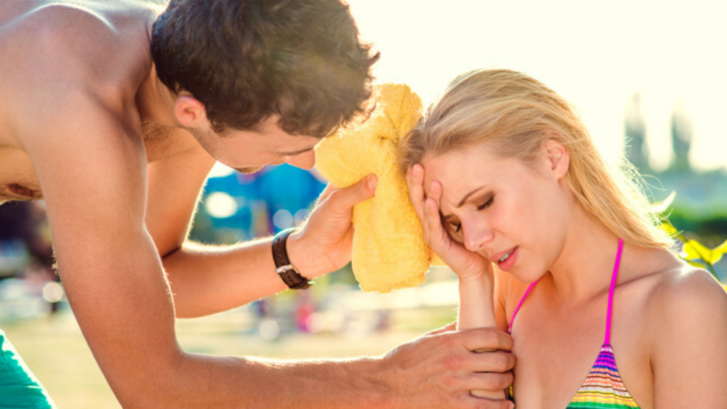Top 5 Common Summer Illnesses and How to Fight Them
Summer is here, and it’s time to have fun! Summertime for most people may mean a swim at the beach or pool, a visit to a water park, a hike to the woods, or even a nice evening out by the campfire.
However, before lacing up those boots for the nice hike, or getting your swimwear ready to dive into the water, consider learning about some common yet serious summer illnesses (aside from the summer allergies) that may prevent you from having fun this summer.
Also, remember that Healthpointe is here for you! It is our goal to keep you healthy this Summer. For information on how we can help with your needs, give us a call at 888-719-8448. Walk in to any of the Healthpointe medical offices, such as the La Mirada Office near La Habra, Fullerton, Whittier, San Gabriel Valley, Long Beach and so much more.
Below are the Five Most Common Summer Illnesses, and How to prevent them!
- Food Poisoning
Food poisoning is terrible, and it is one of the most common foodborne illnesses during the summer. Due to the warm summer temperatures, bacteria may begin to spread and can contaminate the food and even drinks. Are you thinking about hosting a barbecue outside? Make sure not to leave any food out for too long! Common food poisoning symptoms include abdominal cramping, nausea, vomiting and diarrhea. This illness may last days or, rarely, even weeks.
- Preventing Food Poisoning
If you have food poisoning, make sure you do not eat or drink anything for a few hours. After a few hours, make sure you are hydrated and take small sips of water. Monitor your symptoms for changes or improvement. Above all else, make sure you rest. Finally, if symptoms persist more than a day or two or worsen, visit a doctor right away.
- Urinary Tract Infection ( UTI )
One of the more serious common illnesses during the summer is the dreaded urinary tract infection. While more common in woman than with men, UTIs tend to reach their peak during the summer season. Dehydration is one of the biggest causes of bladder infections along with failing to maintain proper hygiene. Most individuals become dehydrated due to the summer heat, and as a result, this allows bacteria to grow and thrive in the bladder area. This is what essentially causes the UTI. If you notice that you are not going to the restroom as frequently or if your urine is dark-colored, then you may be dehydrated.
- Preventing Urinary Tract Infection ( UTI )
To help prevent a UTI, make sure you stay hydrated and drink plenty of water daily often during periods of intense heat or after exercising. Urinate when you have the urge to go, and avoid holding in urine for a long time. If you notice burning with urination and having to go more frequently, you probably have a UTI. Time to see a doctor promptly. In the mean time, you can take Azo, a temporary UTI relief supplement capsules, which will not treat the infection, but help with the discomfort until you can be treated by a physician. If you begin throwing up excessively, start developing nausea or a fever and experience back pain, visit an urgent care or emergency room immediately.
- Heat Stroke, Heat Exhaustion and Heat Cramps
Sure, sun can be quite relaxing and soothing while you’re swimming in the pool, but too much sun can cause some serious heat-related illnesses; one of which is a heat stroke! A heat stroke is typically a result of long, excessive exposures to hot temperatures. This causes your body to lose the ability to cool itself off, and suffer a dangerous rise of temperature (104 F or higher). Another common condition is heat exhaustion, which is your body’s response to an excessive loss of water and salt, usually through sweating. This may cause symptoms such as rapid heart beats, dizziness, nausea, vomiting, and extreme weakness or fatigue. Finally, heat cramps is also associated with an excessive exposure to heat and normally affects workers who sweat a lot during strenuous activities. Muscle cramps and pain may occur in the abdomen, arms or legs.
- Preventing Heat Stroke
For those who are not swimming, it’s recommended to carry a bottle of ice water with you to lower your temperature. It is also recommended to carry ice and/or cooling blankets to wrap around to lower your temperature. When experiencing symptoms related to heat exhaustion or heat cramps, its highly recommended to rest in a cool area. However, if you’re suffering from a heat stroke, it is imperative that you seek and/or request immediate medical attention. Medication may also assist to lower your temperature. However, you should visit a doctor immediately if these techniques fail to lower your temperature and you experience extreme fatigue and shivering.
- Sunburn
You may think that sunburn may be a non-lethal type of illness, but think again! Sunburns are known to cause melanoma, a deadly yet not uncommon skin cancer that affects more than 200,000 people per year1. That’s not all. Being exposed for prolonged periods can make the skin off-colored red, which is unhealthy to the body. Sunburns can be accompanied by blisters, and individuals may experience symptoms such as chills, itchiness, fevers, nausea, vomiting, and more.
- Preventing Sunburn
The best way to beat a sunburn is with sunblock, or sunscreen. This is a topical medication known to prevent sunburn, so don’t go to the pool without it! It’s recommended to use broad-spectrum (UVA and UVB) protection with SPF of 30 or higher. Anything lower and the topical cream may not be as effective in preventing your skin from being burnt. Also, be sure to reapply the sunscreen as directed, usually every 1 to 2 hours, or more often if you are engaging in sports or swimming.
- Recreational Water Illnesses (RWIs)
Do you plan on going to the beach, lake, river or pool? Make sure you remind your children to be careful and not drink the water! Research has shown that kids and animals are prone to move their bowels and leave fecal matter in the ocean, lake or pool, especially during the summer2. Gross, right? It’s true! There is a higher tendency for people to visit the pools and oceans during the summer, and chances for a child or animal to leave excrement there heightens. As a result, different germs and bacteria may be transmitted through the water in pools, lakes, and oceans, which causes recreational water illnesses (RWIs). Such illnesses include e-coli that causes symptoms such as severe stomach cramps, stomach tenderness, diarrhea (may be bloody), nausea, vomiting, high fever, to more severe symptoms such as kidney failure and anemia. According to the Centers for Disease Control and Prevention, chlorine may not kill the germs that causes Recreational Water Illnesses in time to prevent it from affecting swimmers, such as Cryptosporidium. Crypto can survive for days even in a properly disinfected pool3.
- Preventing Recreational Water Illnesses
Simply do not drink the water in lakes, pools or oceans. Additionally, make sure you promote and maintain proper hygiene, so ensure that hands are washed after every bathroom use. It is also recommended for people to visit a doctor for optimal treatment. One thing to keep in mind is that antibiotics should not be taken as it is not a recommended medication to treat e-coli.
For more useful health information, be sure to check out our other Healthpointe blogs!
Medically Reviewed by Dr. Roman Shulze, M.D.
Reference:
[1] Cancer Facts and Figures 2017. American Cancer Society. http://www.cancer.org/acs/groups/content/@editorial/documents/document/acspc-048738.pdf.
[2] American Chemical Society. (2015, July 15). Attention beachgoers: Fecal contamination affects sand more than water. ScienceDaily. Retrieved August 9, 2017 from www.sciencedaily.com/releases/2015/07/150715122522.htm
[3] Centers for Disease Control and Prevention (2017, January 25). Recreational Water Illnesses. Retrieved from https://www.cdc.gov/healthywater/swimming/swimmers/rwi.html

